|
De Engelse dichter en geleerde Thomas Gray werd geboren op 26 december 1716 in Londen. Zie ook alle tags voor Thomas Gray op dit blog.
The Bard
1.3
Cold is Cadwallo's tongue,
That hush'd the stormy main:
Brave Urien sleeps upon his craggy bed:
Mountains, ye mourn in vain
Modred, whose magic song
Made huge Plinlimmon bow his cloud-top'd head.
On dreary Arvon'sÊ shore they lie,
Smear'd with gore, and ghastly pale:
Far, far aloof th' affrighted ravens sail;
The famish'd Eagle screams, and passes by.
Dear lost companions of my tuneful art,
Dear, as the light that visits these sad eyes,
Dear, as the ruddy drops that warm my heart,
Ye died amidst your country's cries--
No more I weep. They do not sleep.
On yonder cliffs, a griesly band,
I see them sit, they linger yet,
Avengers of their native land:
With me in dreadful harmony they join,
And weave with bloody hands, the tissue of thy line.'
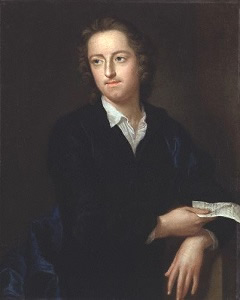
Thomas Gray (26 december 1716 – 30 juli 1771)
Portret door John Giles Eccardt, 1747-1748
De Franse schrijver, polemist en journalist Jean Galtier-Boissière werd geboren op 26 december 1891 in Parijs. Zie ook alle tags voor Jean Galtier-Boissière op dit blog.
Uit: Mémoires d’un Parisien (Nos amours de jeunesse)
« Sachant que je serai de garde dans un commissariat près des Buttes-Chaumont, j’ai prévenu ma famille pour qu’elle vienne me faire ses adieux. J’emmène mes parents et ma sœur dans une épicerie-débit, à côté du poste. Le patron avance des sièges, je commande du pinard.
– Tu vas boire du vin, comme ça !... s’écrie ma mère, outrée de ces vilaines façons. Ah ! non, merci, pas pour moi !
– Mais maman, on ne va pas te servir du thé, ici ! Ah ! vous me faites bien rigoler, tous les trois ! On dirait la famille royale à Varennes, chez l’épicier Sauce !
Tout en me comblant de recommandations variées, ma mère me passe une ceinture de cuir renfermant trente louis d’or.
– Si tu es fait prisonnier, ça te servira toujours !
Mes parents sont très émus ; mais, au bout de cinq minutes, comme dans toutes les grandes circonstances, nous ne trouvons absolument plus rien à nous dire.
Tous les quarts d’heure, des sergents de ville se glissent prestement dans la boutique.
– Alors, patron
– Oui, oui, messieurs, dit le patron, en versant un coup de blanc sur le zinc.
Les agents lèvent le coude, puis s’esquivent. C’est toujours la tournée du patron, bien entendu.
– C’est curieux, dit mon père, qui s’honore d’avoir écrit plusieurs livres de propagande antialcoolique, il a fallu une guerre franco-allemande pour me révéler l’intempérance des gardiens de la paix!"
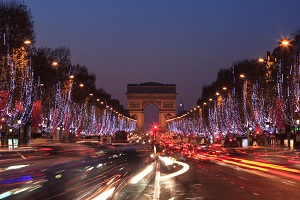
Jean Galtier-Boissière (26 december 1891 – 22 januari 1966)
Parijs, les Champs-Elysées in kerstsfeer
De Duitse dichter en schrijver Ernst Moritz Arndt werd op 26 december 1769 in Groß-Schoritz geboren op het eiland Rügen. Zie ook alle tags voor Ernst Moritz Arndt op dit blog.
Jesusgebet
Herr, du mein Licht, mein Heil, mein Leben,
Du süßer Heiland Jesus Christ!
Hilf, Herr! Hilf! Laß mich nicht entschweben
Von dir, wo Seelenfreude ist,
Wo Einfalt ist, wo Frieden ist,
Bei dir, bei dir, Herr Jesus Christ!
Hilf! Laß mich nicht im Schein verwildern
Der Welt, die tausendfarbig gleißt,
Die lockt, die Wesen durchzubildern,
Soweit das All die Bahnen kreist –
O gib mir deinen stillen Geist,
Des Namen Lieb' und Demut heißt!
O könnt' ich schaun aus deinem Bilde
Der Welten Ziel, der Menschen Sein
Mit voller Klarheit, voller Milde,
Dann wäre schon der Himmel mein,
Dann täuschte mich kein Schein vom Schein,
Das Licht der Lichter wäre mein.
O Licht der Lichter! Bild der Bilder!
Du Gottesglanz, du Liebesglanz!
Du Stiller, Treuer, Frommer, Milder,
Erleuchte mir die Seele ganz!
Dein Bild dies bilde ganz mir ein!
Und werde, bleibe ewig mein!
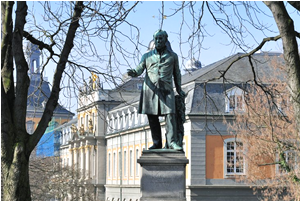
Ernst Moritz Arndt (26 december 1769 – 29 januari 1860)
Monument in Bonn
De Zwitserse dichter en schrijver Freiherr Johann Gaudenz von Salis-Seewis werd geboren op 26 december 1762 op slot Bothmar bei Malans. Zie ook alle tags voor Johann Gaudenz von Salis-Seewis op dit blog.
Morgenpsalm
Der Erdkreis feiert noch im Dämmerschein;
Still, wie die Lamp' in Tempelhallen, hängt
Der Morgenstern; es dampft vom Buchenhain,
Der, Kuppeln gleich, empor die Wipfel drängt.
Sieh', naher Felsen düstrer Zinn' entglüht
Der Rose gleich, die über Trümmern blüht.
Wem dampft das Opfer der bethauten Flur?
Ihr Duft, der hoch in Silbernebeln dringt,
Ist Weihrauch, den die ländliche Natur
Dem Herrn auf niedern Rasenstufen bringt.
Die Himmel sind ein Hochaltar des Herrn,
Ein Opferfunken nur der Morgenstern.
Im Morgenroth, das naher Gletscher Reih'n
Und ferner Meere Grenzkreis glorreich hellt,
Verdämmert seines Thrones Wiederschein,
Der mild auf Menschen, hell auf Gräber fällt
Er leuchtet Huld auf redliches Vertrau'n
Und Licht der Ewigkeit durch Todesgraun.
Noch wandeln wir, wo kaum der Aufgang tagt,
Im ersten Frühschein der Unsterblichkeit.
Der Tag, wo Unschuld nimmer irrt, noch klagt,
Glänzt hinter Gräbern auf, und ist nicht weit.
Des Wahnes Dunst, des Todes Nacht zerfleußt,
O Allmacht, dir, die mir Erlöser heißt!
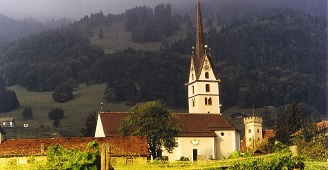
Johann Gaudenz von Salis-Seewis (26 december 1762 – 29 januari 1834)
De kerk van Malans
De Amerikaanse schrijfster Emma Dorothy Eliza Nevitte Southworth werd geboren op 26 december 1819 in Washington, D.C. Zie ook alle tags voor E. D. E. N. Southworth op dit blog.
Uit: The Hidden Hand
“It was the night of the last day of October, eighteen hundred and forty-five. The evening had closed in very dark and gloomy. About dusk the wind arose in the northwest, driving up masses of leaden-hued clouds, and in a few minutes the ground was covered deep with snow and the air was filled with driving sleet.
As this was All Hallow Eve, the dreadful inclemency of the weather did not prevent the negroes of Hurricane Hall from availing themselves of their capricious old master's permission and going off in a body to a banjo breakdown held in the negro quarters of their next neighbor.
Upon this evening, then, there was left at Hurricane Hall only Major Warfield, Mrs. Condiment, his little housekeeper, and Wool, his body servant.
Early in the evening the old hall was shut up closely to keep out as much as possible the sound of the storm that roared through the mountain chasms and cannonaded the walls of the house as if determined to force an entrance. As soon as she had seen that all was safe, Mrs. Condiment went to bed and went to sleep.
It was about ten o'clock that night that Old Hurricane, well wrapped up in his quilted flannel dressing-gown, sat in his well-padded easy-chair before a warm and bright fire, taking his comfort in his own most comfortable bedroom. This was the hour of the coziest enjoyment to the self-indulgent old Sybarite, who dearly loved his own ease. And, indeed, every means and appliance of bodily comfort was at hand. Strong oaken shutters and thick, heavy curtains at the windows kept out every draft of air, and so deadened the sound of the wind that its subdued moaning was just sufficient to remind one of the stormy weather without in contrast to the bright warmth within. Old Hurricane, as I said, sat well wrapped up in his wadded dressing-gown, and reclining in his padded easy-chair, with his head thrown back and his feet upon the fire irons, toasting his shins and sipping his punch. On his right stood a little table with a lighted candle, a stack of clay pipes, a jug of punch, lemons, sugar, Holland gin, etc., while on the hearth sat a kettle of boiling water to help replenish the jug, if needful.”
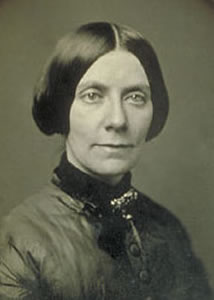
E. D. E. N. Southworth (26 december 1819 – 30 juni 1899)
De Franse dichter, schrijver en filosoof Jean-François de Saint-Lambert werd geboren op 26 december 1716 in Nancy. Zie ook alle tags voor Jean-François de Saint-Lambert op dit blog.
L’Hiver (Fragment)
C’est ainsi que d’un dieu méditant les desseins,
J’admirois ce grand tout, ouvrage de ses mains,
Et j’apprenois du moins à subir sans murmure
Ces rigueurs d’un moment qu’a pour nous la nature.
Les airs étoient sereins ; des soleils radieux
Sémoient de leurs traits d’or le bleu sombre des cieux :
Mais Borée apporta ces frimats invisibles,
Ces atomes perçants, ces dards imperceptibles
Qui font sentir du froid la mortelle âpreté.
Ils couvrent les gazons d’un duvet argenté,
Ils délivrent les airs de la vapeur humide
Qui retombe en crystal sur le limon solide.
Je le sens au matin ce limon condensé,
Résister sous mes pas dans le chemin glacé ;
Je vois l’astre du jour, dont la flamme rougeâtre
Eclate à l’orient sur l’horison bleuâtre :
Il nous lance un moment quelques traits impuissants ;
Le souffle de Borée a pénétré mes sens.
La nuit revient d’abord augmenter la froidure ;
Des chaînes de crystal vont charger la nature ;
Déja je n’entends plus la course des ruisseaux ;
La cascade muette a suspendu ses eaux :
Le berger qui la voit au lever de l’aurore,
L’observe en écoutant & croit l’entendre encore.
Les glaçons réunis sur les vastes étangs,
Renferment sous un mur leurs tristes habitants.
Le fleuve est arrêté dans sa course rapide,
Il tente de briser sa surface solide ;
Contre ses fers nouveaux vainement mutiné,
Sous le crystal vainqueur il roule emprisonné.
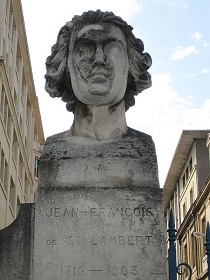
Jean-François de Saint-Lambert (26 december 1716 – 9 februari 1803)
Borstbeeld in Nancy
26-12-2016 om 09:41
geschreven door Romenu 
Tags:Thomas Gray Jean Galtier-Boissière, Ernst Moritz Arndt, Johann Gaudenz von Salis-Seewis, E. D. E. N. Southworth, Jean-François de Saint-Lambert, Romenu
|

